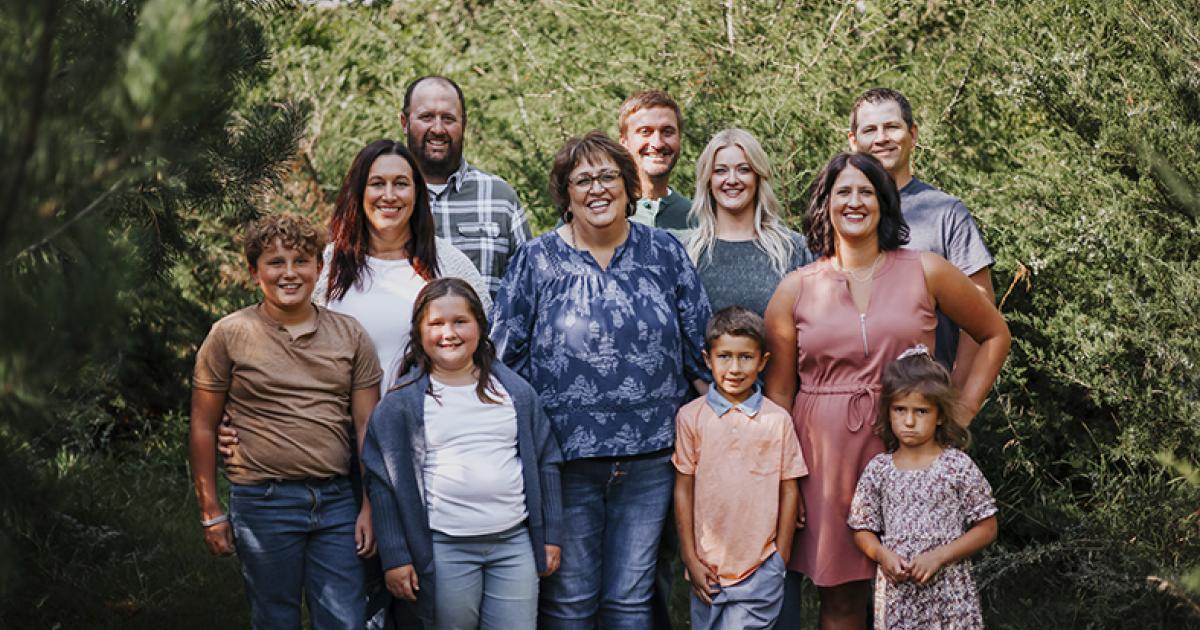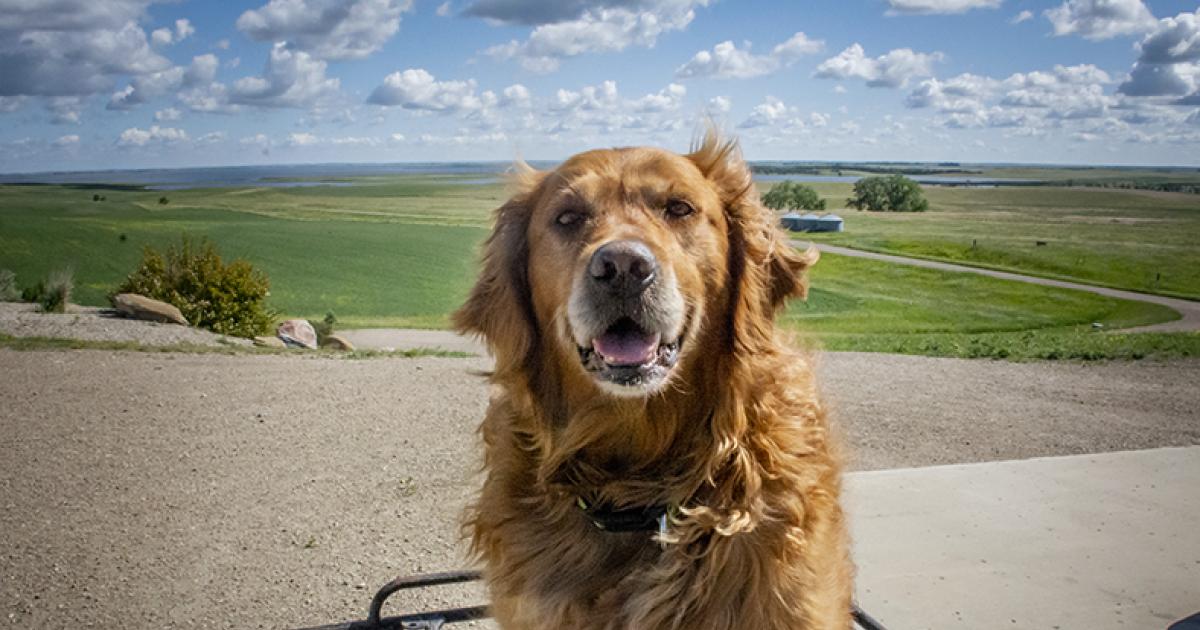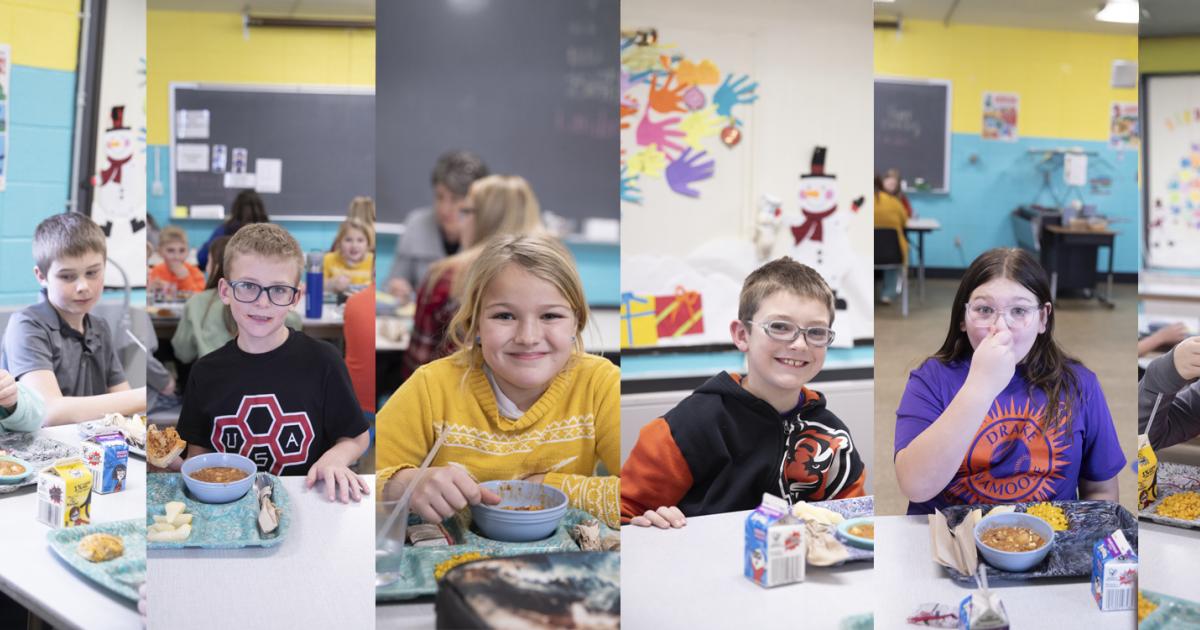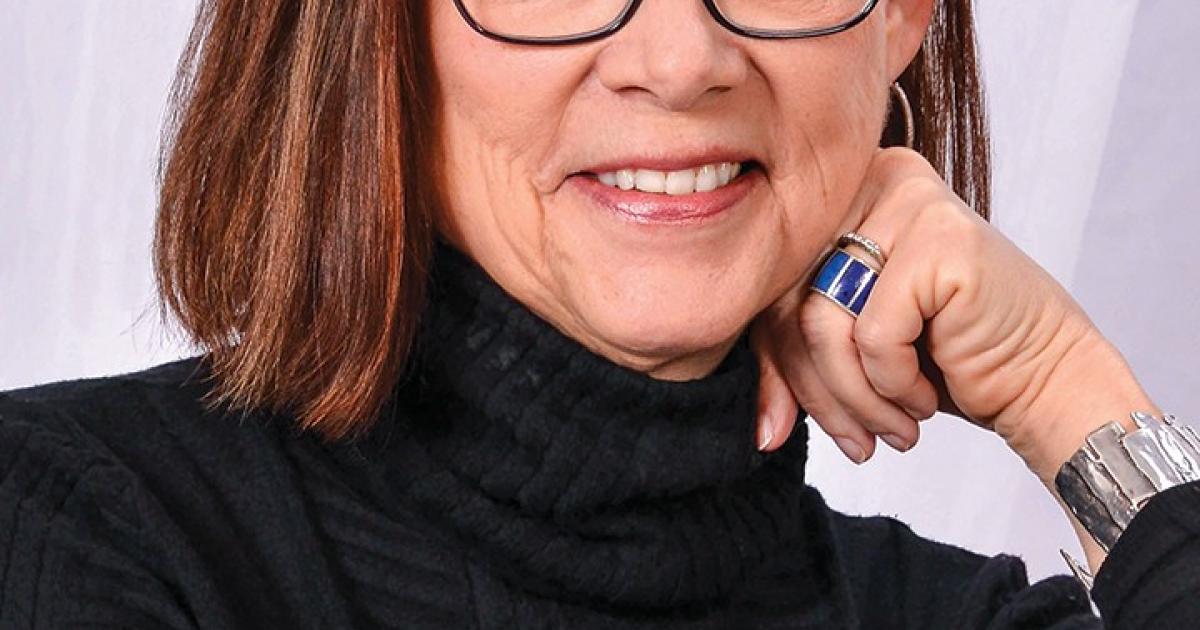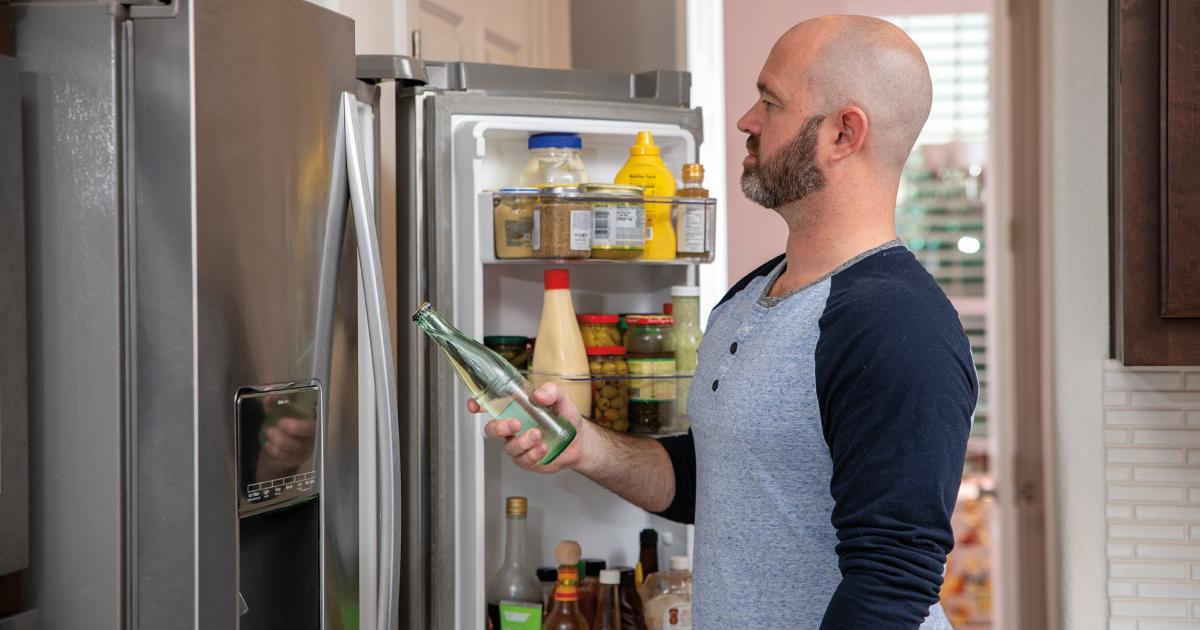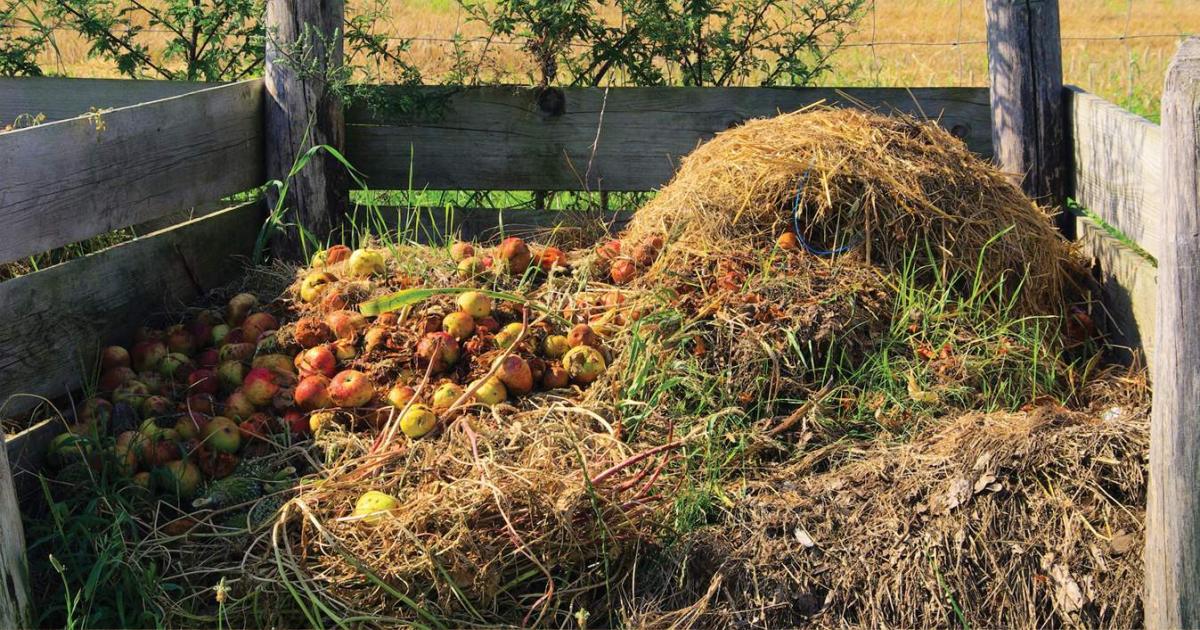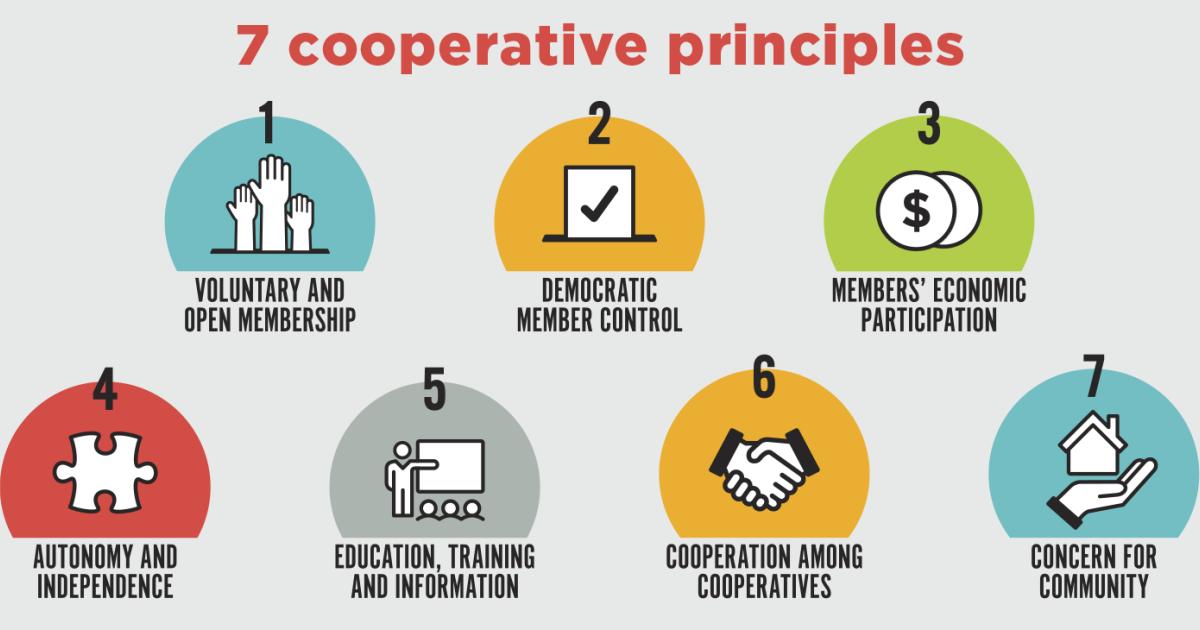The Peterson family encourages yours to “take the family picture,” even if not everyone is happy about it. This is the last family photo the Petersons have with their matriarch, Julie Peterson, center, who died in June. Her family, which includes Dustin, Krissy, Dylan and Everett Peterson; Darin and Cally Peterson; and Nellie, Mike, Owen and Kylie Wachter, misses her every day and hopes they make her proud.
Two of my friends lost their dads this year to cancer.
My childhood best friend didn’t even get a week with her dad. Another friend watched her dad struggle with cancer for years.
My husband knows both experiences intimately.
JULIE
My father-in-law, Keith Peterson, was a Northern Plains Electric Cooperative lineworker for many years in Robinson. His son, Dustin, is the second Peterson to run the Robinson outpost. Keith died in 2011 after a two-year battle with esophageal cancer.
Keith was a good dad and husband, a hard worker and didn’t say much. When he did speak, people listened.
An old co-worker told us this summer about something Keith said which she never forgot.
When some were complaining about their spouses at work one day, Keith said, “I must have hit the jackpot with Julie,” his wife. He wasn’t wrong.
When my husband, Darin, called in early June, I had just finished my last leg of a more than 15-mile trail run in Aspen, Colo. His mom was in the emergency room. The doctors found a mass, which turned out to be cancer.
Twenty days later, I got another call from my husband shortly after starting my workday.
“Mom died.”
The weight of his words knocked me to my knees.
Cancer knew it was no match for Julie Peterson, so it didn’t give her the time to fight.
Keith wasn’t the only one who hit the jackpot with Julie. I hit the mother-in-law jackpot. She loved me like her own.
I asked my husband, “What do you love most about your mom?”
“Everything,” he answered.
She celebrated our wins and loved us through our mistakes. She always had our backs. She was our rock.
Now, she’s gone.
She still needed to teach me how to change a diaper (and keep a kid alive). She was supposed to (hopefully someday) see her son as a daddy. Her kids were too young to not have parents. The thought of her grandkids going through life without Grandma Jules is too sad to bear.
It’s been a really hard year.
ASPEN
I don’t have any revolutionary tips for navigating loss and grief, but I do know a golden retriever helps.
Aspen was our golden girl. She was the best part of every day. She dried (well, licked) our tears and warmed our sadness.
In October, Aspen died. From cancer.
Who would get us through this?
HOPE
I know I’m not special. Many of you have likely experienced something similar, or far worse.
Maybe this is your first Christmas without your mom. Did you lose your dog, too? I know a piece of my mother-in-law died when she lost her spouse. My heart aches for the parents who have lost children. Some holes don’t fill, but my grief will see yours. You are not alone.
I read something recently that “hit me in the feels,” as the kids say: One day, we wake up and realize grief has folded into our bones, becoming a quiet part of the person we’ve grown into.
Hope. That’s what I felt. How nice to consider it might not always hurt this bad.
I hope the grief inside of you won’t be this loud forever.
___
Cally Peterson is editor of North Dakota Living. She can be reached at cpeterson@ndarec.com.
Let’s talk about grief
by Cally Peterson
For individuals navigating loss and grief, the holidays may not bring good cheer.
“We call this the holiday season – Thanksgiving, Christmas, New Year’s – all these things kind of clump together. And yes, it’s going to be a really hard time for somebody who’s lost a loved one,” says Eileen Lisko, a Northern Plains Electric Cooperative member who has facilitated grief support groups for 20 years.
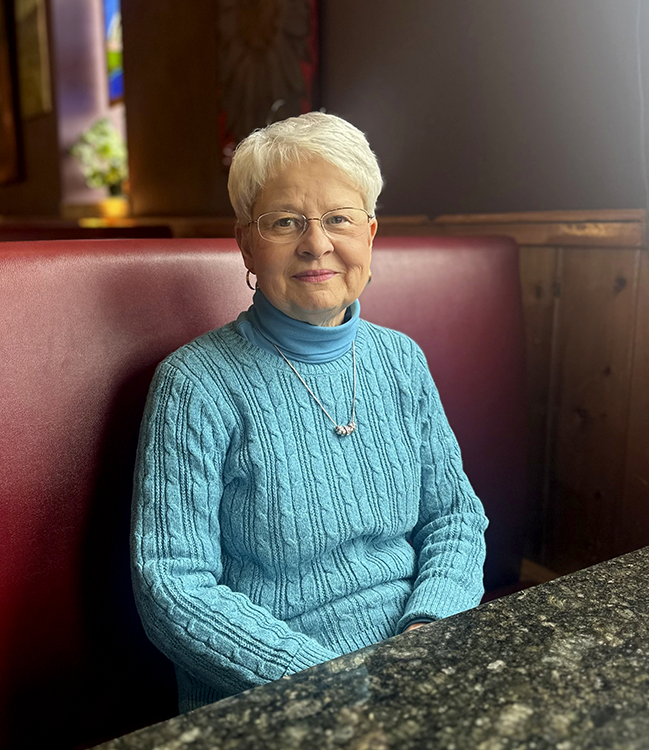
Photo by NDAREC/Cally Peterson
Eileen and her husband, Dan, a licensed funeral director, operated a funeral home in Jamestown and Edgeley for nearly 30 years. She helped start the Jamestown Area Grief Support Team, a nonprofit, all-volunteer organization which offers support groups, retreats and other events for people who are grieving.
North Dakota Living Editor Cally Peterson sat down with Eileen to talk about grief. Whether you are grieving yourself, supporting someone grieving or simply curious to learn, Eileen offers helpful insights for all.
Why is it hard for people to talk about grief?
Truthfully, North America is the most grief-avoidant place on the planet. You turn on the news and see people in war-torn areas in the middle of the street sobbing and crying. If we did that here, someone would lock us up, right?
And I can remember my mother even saying, “Well, we don’t talk about that.” Why don’t we talk about that?
People are uncomfortable with the idea of grief, with the thought of their own grief – or especially somebody else’s – and that leaves people feeling so alone in going through that experience.
What is grief exactly?
Grief isn’t like a disease you’re going to recover from. You are going to grieve someone you loved and lost forever. The pain isn’t always going to be as intense as it is at certain points, but you are going to feel that for the rest of your life.
Grief is what’s going on inside of you, your thoughts and your feelings related to the death of someone you love. You have no control over that.
And if you keep the grief all inside, which so many people do, you’re going to struggle. I like to say grief will have its way with you. Grief is going to win.
Grief is different for everyone. There is no right or wrong way to grieve, but is there a “better-for-us” way?
Crying is good for you. That’s probably the first thing we say in a support group. It’s healthy for you. It’s therapeutic for you. There is a sacredness in tears.
Mourning is what’s going to get you through the experience.
There is a huge difference between grief and mourning. Mourning is when you express that grief outside of yourself. I like to say mourning is grief gone public. It’s when you cry. It’s when you talk about it. It’s when you journal about it. It’s when you write a poem about that person or put together a photo album or a memory book.
If you can, find someone who will be a nonjudgmental listener. Many people aren’t going to be that, because they’re uncomfortable with your tears. The support group is a place where it’s safe to cry.
How can we support someone who is grieving?
Listening is the most important thing you can do for someone who has lost a loved one.
Maybe that person needs to tell the story of their loved one’s death 20 times, but there’s someone to listen. That’s the most valuable gift you can give, because they need to get that grief out of themselves.
If somebody starts crying in front of you, let them cry. Don’t look away. I always implement the Kleenex rule. If you see someone cry, don’t give them a Kleenex, because that’s a signal their tears are making you uncomfortable. Just let them cry.
What about asking, “How can I support you?” Maybe they haven’t thought about how they want to be supported during this time, or maybe no one has asked.
That’s really a good point, because so many people say, “If there’s anything I can do, just call me,” right? And nine times out of 10, that person is never going to call.
In the weeks and months that follow, think about what may be hard for that person. Then, call and offer something specific.
Say, “I’m going to the grocery store. Is there anything I can pick up for you?” “Can I pick your kids up from school?”
What might that first year be like for someone who is grieving a loved one?
The whole first year is filled with birthdays, Christmas, anniversaries. You know, all these special things that come pounding in on you. But I have even had people tell me the second year is worse. It’s different for everybody.
It’s good to contact somebody a month later, two months later, a year later. For some people, I will write the date of the death on my calendar and send a card at that anniversary, because it’s a tough day.
It’s a good thing to talk about that person. So many people think, “Oh, I don’t dare bring up his name or her name, because that’s going to make them sad.” But they’re going to be so happy you remember that person, and if you have memories to share, that’s a gift. Yes, that’s a gift.
Any tips for navigating grief around the holidays?
The worst thing you can do is pretend that person didn’t die and go ahead with your holiday plans as they’ve always been. Don’t do that. Realize it’s going to be a hard day and it’s going to be different.
So, one of the obvious things is make it different. Do something different than you’ve done before.
The other thing is to include the person who died in the celebration, or it’s like the elephant in the room. Bring that out in the open.
Maybe you ask everyone to bring a memory to share of the person who died. Or maybe you light a special candle. Or I have a friend who had her kids and grandkids make or bring an ornament that reminded them of their dad and grandpa. There were fishing lures and shotgun shells on the Christmas tree.
The Christmas shopping, wrapping all the packages, sending Christmas cards, decorating, baking the 1,000 cookies, making a big dinner, those holiday things – you don’t have to do all those things. Think, “What do I have the energy for this year?” “What do I want to do?” Maybe you don’t want to do any of it. You don’t have to.
Eileen, you’re wonderful.
Thanks for all you do for people.
I’m not wonderful at all. I’m not an expert, but because I have done it a lot of years, I have a lot of stories from other people’s experience. I share them all throughout the support groups, because what somebody else says is going to help someone else, you know?
___
To learn more about the Jamestown Area Grief Support Team and find a list of its 2025 programming, visit www.jagst.org or email jagstnd@gmail.com.


